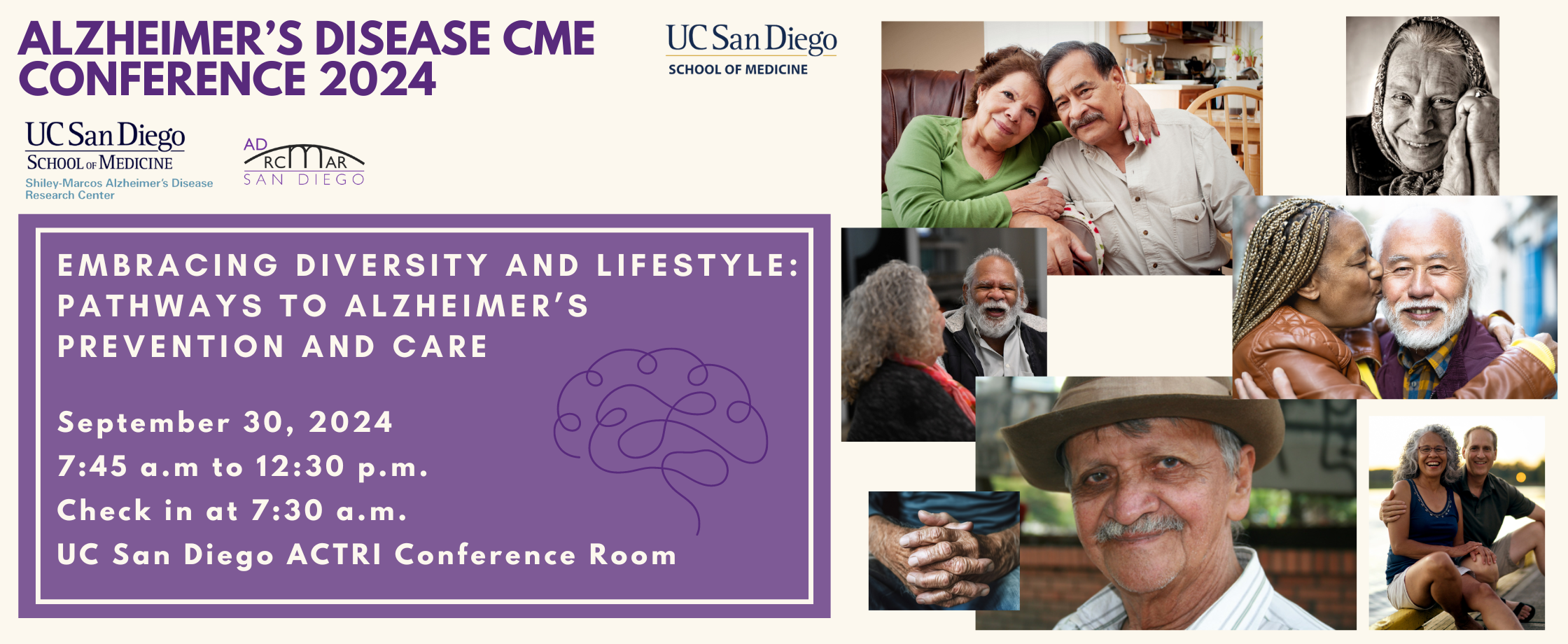WELCOME
Embracing Diversity and Lifestyle: Pathways to Alzheimer's Prevention and Care
Monday, September 30th 2024
7:45 a.m. - 12:00 p.m.
UC San Diego ACTRI Conference Room
Thank you for joining us for this annual CME event, which highlights the cutting-edge academic and scientific environment across the UCSD campus, and the strong relationships with major scientific institutes and broad range of medical and community partners in San Diego County working to advance knowledge and clinical practice in this field of study. This conference, hosted by the UC San Diego Shiley-Marcos Alzheimer’s Disease Research Center and the San Diego Alzheimer’s Disease Resource Center for Minority Aging Research (AD-RCMAR), brings together an internationally renowned faculty from UC San Diego and local partner institutions to present the latest developments in neurodegenerative research. We look forward to having you join us to learn more about the local landscape of this ever-evolving area of research and care.
More about the Conference
LEARNING OBJECTIVES
At the conclusion of this conference, participants should be able to:
- Identify the multitude of factors that influence risk for ADRD in diverse patient populations, including the intersecting impacts of race, class, ethnicity, and sex.
- Analyze the safety, efficacy, and expectations in using the anti-amyloid monoclonal antibodies (AAMAs) including Lecanemab (Leqembi™) and Donanemab (Kisunla™) as the first disease-modifying treatments for AD.
- Recognize the multitude of comorbidities that influence rate of cognitive decline and quality of life in patients with ADRD.
- Evaluate the proportion of risk of cognitive decline that is modifiable and introduce the possibility of reducing dementia risk and prevention through modifiable risk factors.
- Assess the impact of lifestyle interventions related to diet, exercise, sleep, and stress reduction on persons already diagnosed with MCI and early AD, and consider the compounding impact possible with adjunctive therapies.
- Analyze the move to a biologic definition of Alzheimer’s disease (AD), including the recently revised criteria for diagnosis and staging (Alzheimer's Association Workgroup).
TARGET AUDIENCE
Fellow/Reisident, Medical Student, Non-physicians, Nurse, Nurse Assistant, Nursing Home Administrator, Physician, Physician Assistant, Psychologist, Scientist/Researcher, Social Worker.
DISCLOSURE STATEMENT
It is the policy of University of California San Diego Continuing Medical Education to ensure that the content of accredited continuing education and related materials is accurate, balanced, objective, and scientifically justified. Education must be free of the influence or control of ineligible companies, and protect learners from promotion, marketing, and commercial bias. All persons in a position to control the content of accredited continuing education must disclose all financial relationships held with ineligible companies, prior to assuming a role in the activity. Those relationships deemed relevant to the education are mitigated prior to the activity through one of the following strategies, depending on the nature of relationship and the role of the person: 1)divesting the financial relationship, 2) altering the individual’s control overcontent, and/or 3) validating the planning decisions and/or content throughindependent peer review. All relevant financial relationships are mitigated priorto the activity and mitigation strategies and necessary steps for implementationare communicated to individuals prior to them assuming their role in theactivity. Persons who refuse or fail to disclose are disqualified from participatingin the activity. Activities are evaluated by participants and peer reviewers todetermine if the content was free of bias and met acceptable scientific standards. This information is considered in future activity planning.
ACCREDITATION STATEMENT
The University of California San Diego School of Medicine is accredited by the Accreditation Council for Continuing Medical Education to provide continuing medical education for physicians.
CREDIT DESIGNATION STATEMENT
The University of California San Diego School of Medicine designates this live activity for a maximum of 8 AMA PRA Category 1 Credits™. Physicians should claim only the credit commensurate with the extent of their participation in the activity.
AAPA: AAPA accepts certificates of participation for educational activities certified for AMA PRA Category 1 Credit™ from organizations accredited by ACCME or a recognized state medical society. Physician assistants may receive a maximum of 8 hours of Category 1 credit for completing this program.
Nurses: For the purpose of recertification, the American Nurses Credentialing Center accepts AMA PRA Category 1 Credit™ issued by organizations accredited by the ACCME. For the purpose of relicensure, the California Board of Registered Nursing accepts AMA PRA Category 1 Credit™ (report up to 8 hours of credit and list "CME Category 1" as the provider number).
Pharmacists: The California Board of Pharmacy accepts as continuing education for pharmacists coursework which meets the standard of relevance to pharmacy practice and is accepted as continuing education by the Medical Board of California.
Psychologists: The California Board of Psychology recognizes and accepts AMA PRA Category 1 Credit(s)™ for license renewal. Psychologists outside of California should check with their state and local boards to ensure that ACCME accredited activities are acceptable for renewal.
CULTURAL & LINGUISTIC COMPETENCY AND IMPLICIT BIAS
Continuing medical education (CME) providers are required by state Assembly Bills 1195 and 241, and the standards created by the California Medical Association (CMA), to include components that address cultural and linguistic competency and implicit bias in CME activities. The planners and presenters of this activity has been asked to provide meaningful consideration of these standards in the selection and presentation of content. Additional information and resources are available on the UC San Diego CME website.










